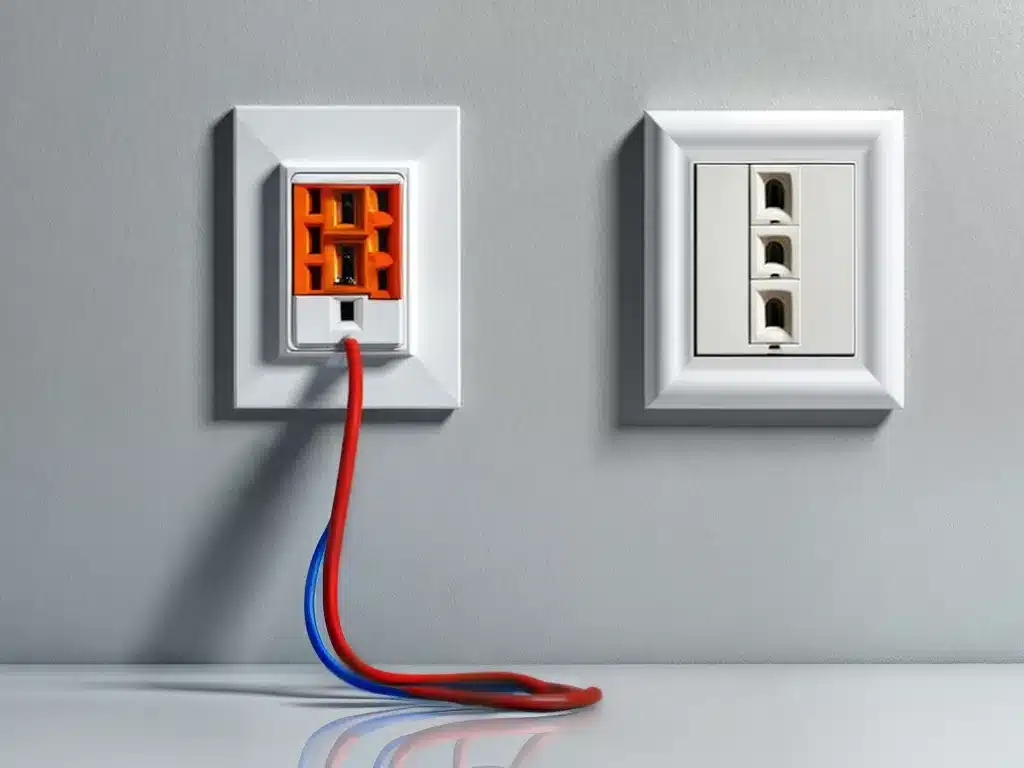
Electrical fires are dangerous and can spread quickly, destroying homes and businesses. Faulty wall outlets are a leading cause of electrical fires. By learning how to spot issues and handling outlets properly, you can avoid electrical fires.
Inspecting Your Wall Outlets
Regularly inspect all electrical outlets and look for warning signs of potential issues. Here are signs to watch for:
Frayed or Damaged Wires
Frayed or cracked wires are major red flags. Exposed wire can arc or spark, igniting nearby materials. Replace any damaged cords or wires immediately.
Unusual Sounds or Smells
Listen and smell around outlets. Cracking, buzzing or sizzling could mean loose connections arcing. Burning plastic smells indicate overheating wires. Have an electrician inspect any suspect outlets.
Discolored or Warm Outlets
Outlets that are discolored or warm to the touch signal problems. Heat buildup leads to fire. Shut off power and have an electrician replace affected outlets.
Loose Outlets
Outlets that slide out or move when plugging in cords are loose from the wall. This creates electric arcing and sparks inside the wall which can ignite. Re-secure any loose outlets.
Cracked or Warped Plastic
Cracked, warped or discolored plastic means the outlet is overheating. Have it replaced before it causes a fire. The new outlet may need a deeper wall box for airflow.
Using Outlets Safely
Once you’ve inspected your outlets, keep using them safely. Here are tips to avoid overloads and sparks:
Don’t Overload Outlets
Plugging too many devices into one outlet can cause overheating. Check the outlet’s amp rating and only plug in devices requiring amps equal or less. For higher demand devices, plug directly into the wall outlet instead of power strips.
Insert Plugs Fully
Loose plugs that are partially inserted can arc, spark and overheat. Plug devices in fully so no part of the prongs is visible. Consider adding childproof caps to prevent loose plugs.
Don’t Use Extension Cords Long Term
Extension cords are meant for temporary use only. The longer the cord, the more resistance and heat buildup. Use surge protectors or have more permanent outlets installed instead.
Unplug Devices When Not in Use
Electrical devices draw power even when switched “off” unless unplugged. Unplug small appliances like toasters when not in use to prevent passive overload. Use power strips to easily disconnect multiple devices.
Check for Recalls
Faulty devices cause many electrical fires. Check the CPSC website for recalls on any electrical products you own. Stop using and replace any recalled devices immediately.
Replacing Old or Damaged Outlets
If you spot any outlets that are outdated, damaged or improperly wired, replacement is the solution. Here are tips for safely upgrading:
Hire an Electrician
Electrical work should only be done by qualified electricians as it can be hazardous. Improper work could cause fires. Research electricians and check credentials before hiring one.
Replace Two-Prong Outlets
Two-prong outlets are outdated and lack a ground wire. These should be replaced with updated, grounded three-prong outlets to prevent shocks and reduce fire risks.
Upgrade Overloaded Circuits
If you frequently trip breakers or blow fuses, your outlets may be overloaded. Have an electrician inspect the electrical panel and run new circuits to add more outlets if needed.
Install AFCI Receptacles
AFCI receptacles shut off electricity when dangerous arcing occurs. Though more expensive, these outlets prevent electrical fires and are now required for new construction.
Use Deep Wall Boxes
Shallow electrical boxes can overheat plugs and wires. Upgrade to deeper boxes so outlets have room to breathe. This reduces fire hazards.
By inspecting, using and upgrading wall outlets properly, you can catch problems before they turn into electrical fires. Follow these tips for home and family safety.
